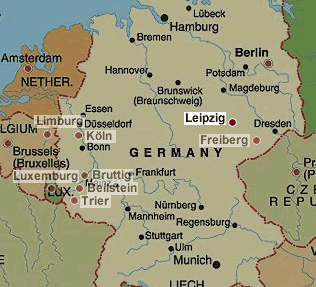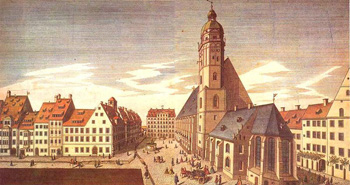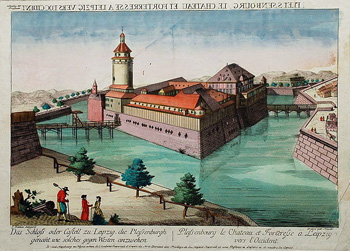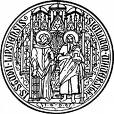Life
Leipzig

In the same year, on 25.4.1515, he registered at Leipzig university where scholastics still dominated the scene. Mosellanus as well as Borner served there als university teachers to the best of their abilities. In comparing both friends among each other Mosellanus was considered to be the better scholar while Borner had more talents as an organizer. Mosellanus had moved to Leipzig with the intention to teach the Greek language. From this point of view it was particularly disappointing to him to learn that prior to his arrival at Leipzig the Englishman Richard Croke (Crocus) had been appointed as professor of Greek at Leipzig university. Nevertheless, Mosellanus sought his friendship and due to his talents and diligent study of the Greek language he became his favourite student.

In 1517 Richard Crocus left Leipzig and returned to Cambridge university in England. There he was appointed professor of the Greek language and took over the position of Erasmus who served there between 1511 and 1513. Crocus had pleaded for Mosellanus to become his successor with the Duke of Saxony before he left for England and did this successfully. Mosellanus delivered a famous address when he started his professorship which was called: De variarum linguarum cognitione paranda oratio (About the acquisition of a thorough knowledge of languages). This address attracted a high degree of attention, not only in Leipzig but also at Louvain university (Belgium) where Jacobus Latomus in particular belonged to his critcs. Latomus’ work “Dialogus” was considered to be a straight answer to Mosellanus’ oratio.
Richard Crocus attempted to persuade Mosellanus to follow him to England but Mosellanus turned down his request. Crocus as well as Mosellanus were said to have been the founders of establishing and promoting the Greek language at Leipzig university as a subject. The Duke of Saxony and many other members of nobility favoured the rise of sciences which, in many ways, was to the advantage of Petrus Mosellanus. Despite of all teaching successes Mosellanus sought for a new position elsewhere. His attempt to gain the professorship in Greek at Wittenberg university failed as Melanchton was appointed instead next to Martin Luther.

In june 1519 he held the opening address on occasion of the Leipzig disputation between Luther, Karlstad and Eck at the Pleissenburg of Leipzig which was titled: About the proper way to dispute theological matters. It took about an hour and a half to deliver. Following the address, on Mosellanus’ own request, the “Veni sancte spiritus” was played three times. During the later course of the disputation Mosellanus’ role was restricted to the one of a spectator. We owe him a detailed description of the participating debaters and Martin Luther in particular. He referred to them in great detail in a number of letters to friends and fellow humanists.
In mid-july 1519 he went on an extended vacation and, travelling via Erfurt, where he fell ill, to Trier, he visited his birth region again for the first time. He visited his relatives in the Cochem area and proceeded to Trier to see his promotor archbishop Richard von Greiffenklau. The latter offered him a position in his diocese which Mosellanus kindly refused. He travelled back via Erfurt, Naumburg, Pegau and Meissen where he stayed for a short period. There he translated and rewrote 5 books of Gregor of Nazianz which he published not earlier than 1523.

Early 1520 he returned to Leipzig where he promoted to become a magister and on 20th august that year he obtained the title of a Baccalaureus ad cursum (theology). A few months before he was elected rector of the university for the summer semester. During this period his lectures about Augustine and the letters of Paul lead to a fast growing audience. His letter to Mutian describes this unexpected and welcome development. In june 1520 he became a member of the great Duke’s college which was connected to an annual income of 100 gold guilders. Triggered by the confusing and disturbing events of that time Petrus Mosellanus planned a extended trip to Italy to seek distance to Leipzig. Erasmus, at that time residing in Basle (Switzerland), encouraged him in his letter of 8th august 1520 to do so and offered him to accompany him on the trip. This journey unfortunately never took place.
The following year 1523 was one of the most productive in Mosellanus’ life. He reworked many translations, published the 5 books of Nazianz, wrote a paper about rhetoric and many other works. That same year he was elected rector of the winter semester for the second time. At the closing of that period, on 16th october 1523, he fell seriously ill and his life and career slowly began to vanish. His scholar Julius von Pflug and other friends stayed near his bed until he passed away on 19th april 1524. His final resting place was the altar of the Nicolaikirche at Leipzig. 12 years later a marble commemorative plaque was erected by Julius von Pflug inscribed with Latin end Greek distichs by Melanchton. In the center was mentioned:
“Klein war er an Lebenskraft aber gewaltig an Geist.” (translated: “Small were his vital powers but his mind was gigantic.”)
Unfortunateley, these monuments are no longer in place as they were removed during the restaurations in 1785 to 1797.